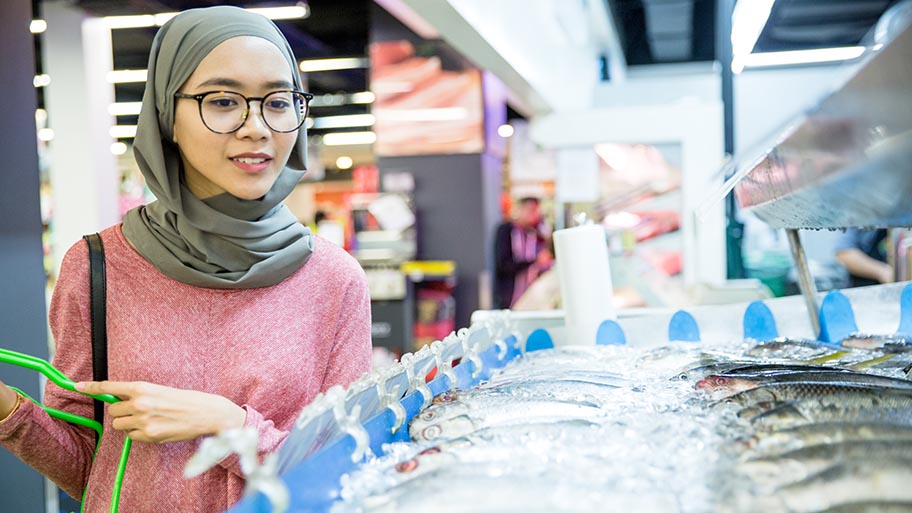As nearly $900,000 USD is awarded through the MSC’s Ocean Stewardship Fund to sustainable fishing projects around the world, Grants Manager Angela Breslin looks at how buying certified seafood with the blue label supports innovative projects and fisheries at the forefront of sustainability.

Lack of funding to support our oceans
Despite the planet’s biodiversity, climate, and overfishing crises, the conservation and sustainability sector frequently lacks funding. Currently, most countries spend less than 1% of their GDP on “biodiversity-related activities”, including both domestic and foreign environmental aid. This funding gap prevents effective mitigation efforts to tackle biodiversity loss.
Equally worrying is that within our oceans, over-exploitation is still being rewarded. A recent academic analysis found that harmful subsidies worth $22 billion were linked to overfishing through the expansion of national fleets in 2018. In comparison, only $10 billion was spent on subsidies promoting sustainable fisheries.
Private grants and foundations offer some assistance, but funding is often finite, fiercely competitive, and restricted to specific projects or outcomes. So how can we ensure conservation and sustainability initiatives are funded for the long term and make the greatest impact?
A growth of seafood consumer interest in sustainability
Recent research involving more than 20,000 people across 23 countries found that 6 in 10 seafood shoppers (58%) have already made changes to the way they choose and buy seafood in the last year in order to protect the fish in our oceans. Whether that’s switching to more sustainable brands, buying different seafood species, or changing where they buy seafood, 8 in 10 seafood consumers were prepared to take further action to safeguard our oceans.
The MSC ecolabel funding model presents an alternative: harnessing the purchasing power of the public and the growing demand for sustainable sourcing.
Harnessing the purchasing power of the public to drive change
The MSC was set up in 1997 by international conservation charity, WWF, together with consumer goods multinational, Unilever, due to concerns about overfishing. The MSC receives the majority of its income through the use of its ecolabel. The ecolabel is used by companies in the supply chain, such as food producers, supermarkets, and restaurants to identify MSC certified seafood.
The MSC does not receive any payment for assessments or certifications of fisheries. As the MSC is a registered not-for-profit, any income we generate goes back into our program of work. This includes the development of our science-based requirements that fisheries must meet to become certified, and ensuring quality control in the supply chain so customers can be assured of their choice.
In addition, 5% of royalties from all MSC product sales are reinvested back into the Ocean Stewardship Fund. The MSC has been funding various sustainable fishing and ocean conservation projects through similar funding schemes since July 2015, with the Ocean Stewardship Fund first launched in 2018.
Supporting conservation NGOs around the world
The Ocean Stewardship Fund encourages organizations to collaborate with fisheries to carry out important sustainability research. This year, twenty fisheries and research projects have been awarded up to £60,000 each from the fund, dedicated to enabling and supporting sustainable fishing around the world.
The nearly $900,000 USD of awards include grants to the RSPB, WWF India, and the Environmental Defense Fund, as well as to fisheries in the Americas, Europe, Asia, and Australia. Projects focus on a range of issues including:
- reducing unwanted catch to prevent unintended impacts on wildlife populations
- improving harvest strategies to ensure stocks are at healthy levels
- ensuring the bait fishers use is sustainable
- ensuring at-sea fisheries observers can carry out their important work safely
Nearly a quarter of funding has been awarded in support of many small-scale fisheries in the Global South.
Last year's grantees included 15 fisheries and projects covering 12 countries and 25 target species. Projects focused on minimizing interactions with endangered, threatened, and protected species and reducing the impacts of ghost fishing from discarded and lost fishing gear.
Consumers are doing more than just rewarding fisheries for their responsible actions – when buying blue-labeled products, they’re contributing to the wider ocean conservation cause. From BirdLife International to ZSL (Zoological Society of London) to WWF South Africa, some of the biggest international conservation organizations are supported through consumers purchasing seafood with the MSC blue label.
The difference that the Ocean Stewardship Fund is making
Despite the impacts of Covid-19, many projects have made great progress. Scientists at VisNed – a fishing association in the Netherlands – have developed an app that helps fisheries in the North Sea accurately report their interactions with endangered, threatened, and protected species. Digitizing records will improve the accuracy of the data as paper lists and charts can be lost at sea. The project was also approached by a local conservation NGO to include data on species they are trying to conserve, such as angel sharks.
In the Indian Ocean, researchers from AZTI on MSC certified Echebastar skipjack tuna fleets successfully tagged 28 silky sharks with satellite tags. The data will help develop new management practices that help ensure any sharks caught as bycatch will survive after being returned to the ocean. In Indonesia, the International Pole and Line Foundation has trained fishery observers to independently monitor fishing operations. The observers have successfully mapped the location of 93 fish aggregating devices and 14 lift nets to help the government better track compliance with new regulations for fishing gear.
The Ocean Stewardship Fund’s focus on collaborative projects is driving innovation and creativity, that will ensure our oceans remain productive and resilient. With over £1.3 million now awarded to organizations and fisheries worldwide through the fund, more fisheries will have access to the tools and guidance required to safeguard their fish stocks and livelihoods for the future. These achievements would not be possible without seafood consumers choosing the MSC blue label every day.


